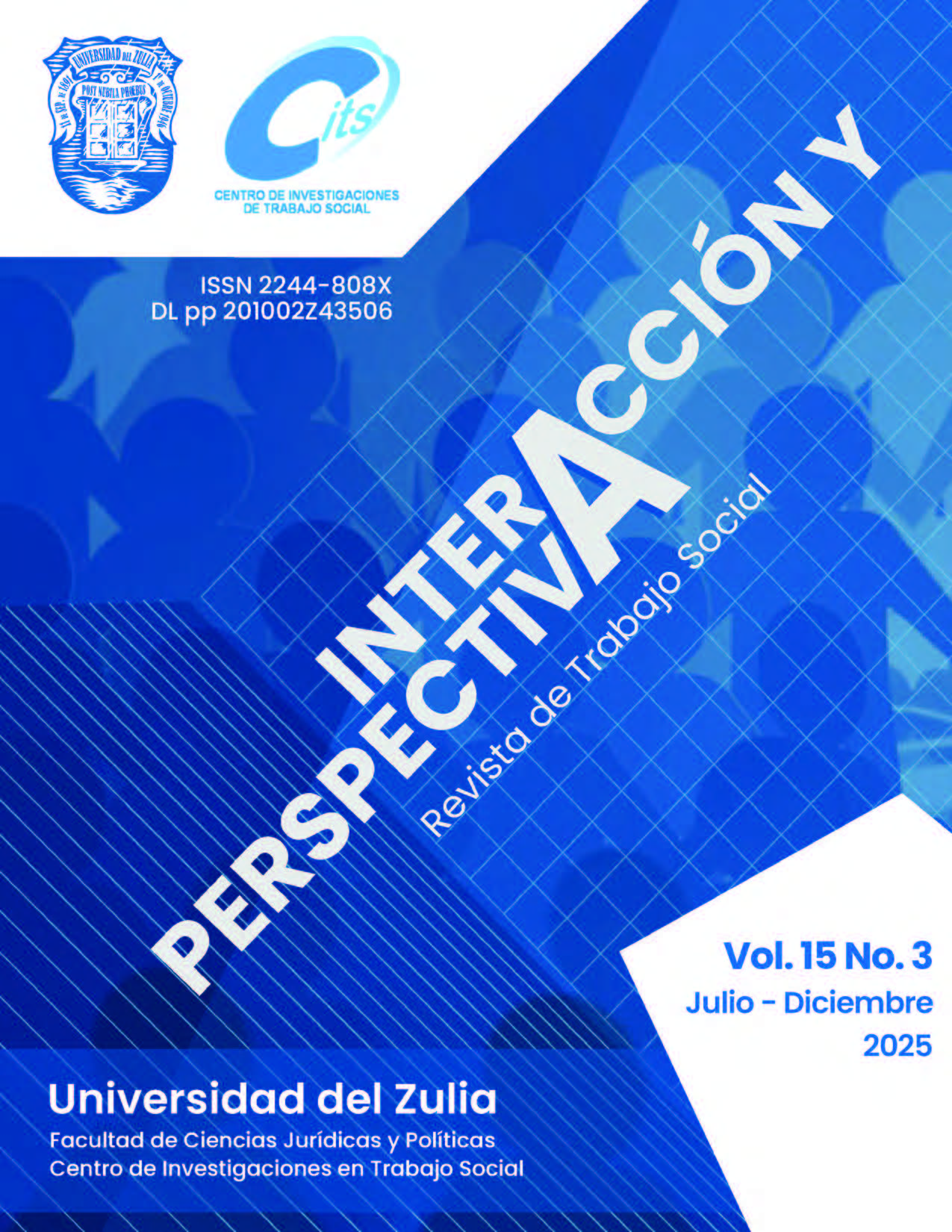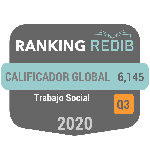The relevance of the neighborhood from the perspective of Social Work professionals and Latin American migrant families living in Spain
Abstract
The aim of this study is to explore the role of the neighborhood in the adaptation and well-being of Latin American families who have migrated to Tenerife (Canary Islands, Spain). Two methodological approaches were employed. From a quantitave perspective, three social work professionals from areas with a high concentration of Latin American residents completed a questionnaire assessing neighborhood quality. On the qualitative side, focus groups were conducted with 12 Latin American migrants living in Tenerife to gather their perceptions of neighborhood quality. The findings highlighted the importance of social cohesion, integration into the local context, and the role of community social services. Participants emphasized the need for greater representation within the community, the desire for intercultural family- oriented leisure activities, the lack of neighborhood relationships, and limited access to certain community services. These results highlight the need to expand communi- ty-based actions and social work interventions to strengthen inclusion mechanisms. This should be done through collaborative efforts among stakeholders, responding to the expressed needs of migrant families and promoting participatory community processes that enhance the well-being of both migrant families and the wider community.
Downloads
References
Ayón, C., & Ghosn, M. (2013). Latino immigrant families’s social support networks: strenghts and limitations during a time of stringent immigration legislation and economic insecurity. Journal of community psychology, 41(3), 356-377. https://doi.org/10.1002/jcop.21542
Berroeta, H., Ramoneda, A., Rodriguez, V., Di Masso, A. y Vidal, T. (2015). Apego de lugar, identidad de lugar, sentido de comunidad yparticipación cívica en personas desplazadas de la ciudad de Chaitén. Magallania, 43(3), 51-63. http://dx.doi.org/10.4067/S0718-2244201500030000
Brandon, M. (2021). Movimientos migratorios en Canarias: de la emigración a América a la inmigración desde África. XXIV Coloquio de Historia Canario-Americana. https://bit.ly/41QZxpu
Bronfenbrenner, U. (1979). The Ecology of Human Development. Cambridge: Harvard University.
Bronfenbrenner, U. y Morris, P.A. (2006). The bioecological model of human development. En W. Damon y R.M. Lerner, Bioecological perspectives on human development. Sage.
Castellano, A. M., y Hinestroza, J. (2017). La Investigación Acción Participativa (IAP): entre la vivencia y el compromiso. Interacción Y Perspectiva, 7(2), 220-232. https://produccioncientificaluz.org/index.php/interaccion/article/view/22925
Cabrera, L. (2016). La integración cultural y social de inmigrantes latinoamericanos en España. Revista Estudios 23, 2-34. https://revistas.ucr.ac.cr/index.php/estudios/article/view/22899
Cueto, J.C. (2021). La poderosa influencia de las Canarias en el español caribeño (y qué hace que los canarios suenen como cubanos o venezolanos). BBC News Mundo. https://www.bbc.com/mundo/noticias-58706623
Diener, E.D., Emmons, R.A., Larsen, R.J. & Griffin, S. (1985). The Satisfaction With Life Scale. Journal of Personality Assessment, 49, 71-75. https://doi.org/10.1207/s15327752jpa4901_13
Fasla, D. (2008). El Español hablado en Cuba: préstamos vigentes, lexicogénesis y variación lingüística. Cuadernos de investigación de Filología, Universidad de la Rioja 33 (73-96). https://dialnet.unirioja.es/servlet/articulo?codigo=3393490
Finotelli, C., y Rinken, S. (2023). A pragmatic bet: The evolution of Spain’s immigration system. Migration Policy Institute. https://www.migrationpolicy.org/article/ pragmatic-bet-evolution-spains-immigration-system
García-Cid, A., Millán-Franco, M., Gómez, L., Moscato, G. & Hombrados-Mendieta, I. (2020). Discrimination and Psychosocial Well-Being of Migrants in Spain: The Moderating Role of Sense of Community. Frontiers in Psychology, 11. https://doi.org/10.3389/fp-syg.2020.02235
García, A., Jiménez, B. y Redondo A. (2009). La inmigración latinoamericana en España en el siglo XXI. Investigaciones geográficas 70. https://www.scielo.org.mx/scielo.php?script=sci_artte xt&pid=S0188-46112009000300004
Gobierno de Canarias (23 de febrero de 2024). Canarias contará con un nuevo Plan de Inmigración en el primer semestre de este año. https://www3.gobiernodecanarias.org/noticias/canarias-contara-con-un-nuevo-plan-de-inmigracion-en-el-primer-semestre-de-este-ano/
Gozálvez, V. (2013). La integración social de las familias africanas y latinoamericanas reagrupadas en la España mediterránea. Papeles de geografía, 57 (58), 101-126. http://hdl.handle.net/10201/38470
Gutiérrez-Rodríguez, N., Álvarez Lorenzo, M. y Rodrigo López, M.J. (2022). Efectos de la migración en el ejercicio de la parentalidad desde las voces de las familias latinoamericanas en Canarias. Alternativas. Cuadernos de Trabajo Social, 29(2), 282-308. https://doi.org/10.14198/ ALTERN.20323
Gutiérrez-Rodríguez, N., Almeida, A.T., Rodrigo, M.J., y Álvarez M. (2023a). Las familias migrantes latinoamericanas con niños, niñas y adolescentes, procesos familiares y aculturativos. Una revisión de la literatura. Cátedra Educació i Adolescència Abel Martínez Oliva.
Gutiérrez-Rodríguez, N., Álvarez, M. y Rodrigo, M. J. (2023b). La parentalidad en las familias latinoamericanas tras la migración: una revisión sistemática de factores de riesgo y factores de protección. Revista Latinoamericana de Estudios de Familia, 15 (2), 37-67. https://doi.org/10.17151/rlef.2023.15.2.3
Gutiérrez-Rodríguez, N., Álvarez, M., Rodrigo, M.J. (2024). Variability of Social Inclusion Patterns Involving Personal, Family and Social Characteristics in Latino Migrant Families in Spain. Child and Family Social Work, 0, (1-13). https://doi.org/10.1111/cfs.13181
Hernández, L., Escala L., (2021). Asociacionismo inmigrante y nuevas formas de acción política. Facebook y la participación online inmigrantes mexicanos en Estados Unidos. Naveg@ mérica, Revista electrónica editada por la Asociación Española de Americanistas, 27. https://doi.org/10.6018/nav.490121
Hernández-González, M. (2005). La emigración canaria a América. Centro de la Cultura Popular Canaria.
Hernández-González, M. (2008). La emigración canaria a América a través de la historia. Cuadernos Americanos, 1(126), 137-172.
Herrero, J., Gracia, E., Fuente, A., y Lila, M. (2012). Desorden social, integración social y bienestar subjetivo en inmigrantes latinoamericanos en España. Anales de Psicología, 28 (2), 505–514. https://doi.org/10.6018/analesps.28.2.148721
Huete, M.A. (2012). Uso y conocimiento de los servicios públicos locales por parte de la población inmigrante. La importancia del barrio y la residencia. Política y Sociedad, 50 (1), 215- 234. http://dx.doi.org/10.5209/rev_POSO.2013.v50.n1.36883
Instituto Nacional de Estadística [INE] (2023). Estadística Continua de Población (ECP). Notas de prensa. https://www.ine.es/daco/daco42/ecp/ecp0323.pdf
Jones-Rounds, M.L., Evans, G.W. & Braubach, M. (2014). The interactive effects of housing and neighbourhood quality on psychological well-being. Epidemiol Community Health 68 (2), 171-175. https://jech.bmj.com/content/68/2/171.citation-tools
Mahmoudi, L. (2016). The Value of the Sense of Community and Neighbouring. Housing, Theory and Society, 33 (3), 357-376. https://doi.org/10.1080/14036096.2016.1155480
Menéndez, S., Hidalgo, M.V., Arenas, A., Lorente, B., Jiménez, L. y Sánchez, J. (2012). La escala para la Evaluación de la Calidad del Vecindario (ECAVE): proceso de elaboración y análisis preliminares de sus propiedades psicométricas. Revista Latinoamericana de Psicología, 44 (3), 133-148. https://doi.org/10.62364/cneip.6.2024.202
Méndez López, Ángel J., y Pérez Cosín, J. V. (2017). Proyecto de autodesarrollo comunitario en el barrio de La Coma del Municipio de Paterna (Valencia, España). Análisis y caracterización. Interacción Y Perspectiva, 7(2), 163-178. https://produccioncientificaluz.org/index.php/interaccion/article/view/22884
Millán-Franco, M. (2019). Análisis del proceso de adaptación de los inmigrantes. [Tesis de Doctorado en Psicología, Universidad de Málaga]. Riuma.
Millán-Franco, M., Domínguez, L., Hombrados-Mendieta, I., y Gómez-Jacinto, L. (2024). Sentido de comunidad en latinoamericanos residentes en Málaga (España): Una propuesta de intervención basada en el fortalecimiento comunitario. Itinerarios de Trabajo Social 4, 50-60. https://doi.org/10.1344/its.i4.41806
Moscato, G., Novara, C., Hombrados-Mendieta, I., Romano, F. & Lavanco, G. (2014). Cultural identification, perceived discrimination and sense of community as predictors of life satisfaction among foreign partners of intercultural families in Italy and Spain: A transnational study. International Journal of Intercultural Relations: IJIR, 40, 22-33. http://dx.doi. org/10.1016/j.ijintrel.2013.11.007
N.U. CEPAL (2023). Panorama Social de América Latina y el Caribe 2023: la inclusión laboral como eje central para el desarrollo social inclusivo. https://hdl.handle.net/11362/68702
Organización Internacional para las Migraciones [OIM], (2024a). Migración, Desarrollo Sostenible y la Agenda 2030. https://www.iom.int/es/migracion-desarrollo-sostenible-y-la-agenda-2030
Organización Internacional para las Migraciones [OIM], (2024b). Integración y cohesión social de los migrantes. https://www.iom.int/es/integracion-y-cohesion-social-de-los-migrantes
Pastrán, F. (2019). Desarrollo cultural canario-venezolano desde la expresión humana, religiosa, deportiva, gastronómica y agrícola. Revista Chakiñan de Ciencias Sociales y Humanidades 7, 118-134. https://www.redalyc.org/journal/5717/571763649010/html/
Pavot, W., Diener, E.D., Colvin, C.R. & Sandvik, E. (1991). Further validation of the Satisfaction With Life Scale: Evidence for the cross-method convergence of well-being. Journal of Personality Assessment, 57, 149-161. https://doi.org/10.1207/s15327752jpa5701_17
Pérez, G. (2002). Investigación Cualitativa. Retos e interrogantes. Técnicas y análisis de datos. Madrid: La Muralla.
Permentier, M., Bolt, G., & Van Ham, M. (2011). Determinants of Neighbourhood Satisfaction and Perception of Neighbourhood Reputation. Urban Studies, 48(5), 977-996. https:// doi.org/10.1177/0042098010367860
Pita, S. y Pértegas, S. (2002). Investigación cuantitativa y cualitativa. Fisterra, 9, 76-78. https://www.fisterra.com/formacion/metodologia-investigacion/investigacion-cuantitativa-cualitativa/
Prezza, M., Amici, M., Roberti, T. & Tedeschi, G. (2001). Sense of community referred to the whole town: Its relations with neighbouring, loneliness, life satisfaction and area of residence. Journal of Community Psychology, 29 (1), 29–52. https://doi.org/10.1002/1520-6629(200101)29:1< 29::AID- JCOP3>3.0.CO;2-C1
Ramos-Vidal, I. y Maya-Jariego, I. (2014). Sentido de comunidad, empoderamiento psicológico y participación ciudadana en trabajadores de organizaciones culturales. Psychosocial Intervention, 23 (3). https://dx.doi.org/10.1016/j.psi.2014.04.001
Ríos, M.L. y Moreno M.P. (2010). Influencia de la participación comunitaria y la identidad con el lugar en la satisfacción vital de inmigrantes. Escritos de Psicología, 3 (2). https://scielo. isciii.es/scielo.php?script=sci_arttext&pid=S1989-38092010000100002
Rodrigo, M.J., Máiquez, M.L., Martín, J.C. y Byrne, S. (2008). Preservación familiar. Un enfoque positivo para la intervención con familias. Madrid: Pirámide.
Rodrigo, M., Máiquez, M., y Martín, J. (2010). Parentalidad positiva y políticas locales de apoyo a las familias. Madrid: Federación Española de Municipios y Provincias. https://www.bienestaryproteccioninfantil.es/fuentes1.asp?sec=6&subs=6&cod=1204&page=
Rodrigo, M. J., Máiquez, M. L., Martín Quintana, J. C., Byrne, S., y Rodríguez, B. (2015). Manual práctico de parentalidad positiva. Síntesis.
Sánchez, E., y García, J.M.A. (2001). Análisis de las motivaciones para la participación en la comunidad. Papers, Revista de Sociología, 63/64, 171-189. http://hdl.handle.net/10481/20404
Santos, M.A. y Lorenzo M.M. (2009) La participación de las familias inmigrantes en la escuela. Un estudio centrado en la procedencia. Revista de Educación 350, 227-300. https://www.educacionfpydeportes.gob.es/dam/jcr:3c548167-5c91-40e2-91c8-b4b8f5306199/re35012-pdf.pdf
Santos, M.T. y Pérez, J.A. (2016). La radio latina en España. Medio de integración. Perfiles latinoamericanos, 24 (48). https://doi.org/10.18504/pl2448-006-2016
Sarason, S. (1974). The Psychological sense of community: Prospects for a community psychology. San Francisco, CA: Jossey Bass. https://www.scirp.org/reference/referencespapers? referenceid=2080506
Sonn, C.C. (2002). Immigrant adaptation: Understanding the process through sense of community. Psychological sense of community: Research, applications, and implications, 205–222. https://psycnet.apa.org/doi/10.1007/978-1-4615-0719-2_11
Suárez, A., Byrne, S., y Rodrigo, M. J. (2016). Validación de la Escala de Parentalidad Positiva (EPP) para evaluar programas presenciales y online de apoyo parental. Revista de estudios e investigación en psicología y educación, 3(2), 112-120. https://doi.org/10.17979/REI- PE.2016.3.2.1883.

















